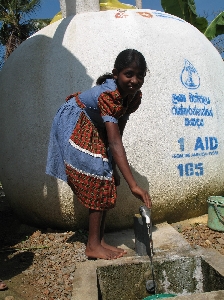
Malteser International: Rain water harvesting – because every drop counts
Contact: Petra Ipp, Senior Desk Officer Communication, Malteser International, +49-221-9822-155, petra.ipp@malteser-international.org
COLOGNE/GALLE. Mar. 20 /Standard Newswire/ -- "Today, we use rain water for bathing, washing, cleaning, cooking and even drinking. My mother and I do not have to walk for hours to the next well and carry home the heavy buckets anymore," tells twelve-year-old Titra, who lives in the Galle District in the south of Sri Lanka together with her parents and her four-year-old brother. Her family is one of more than 3,000 tsunami affected families in the districts of
Photo: Hi-resolution version available
"This form of water supply offers new perspectives and possibilities in coping with water scarcity," says Dr. Juergen Clemens, Senior Desk Officer Sri Lanka of Malteser International: "The access to clean water is a basic need and basic right of every single person. By means of collecting and filtering rain water from their own roof, we can sustainably improve the quality of life of the families, especially of women and young girls who play a key role in ensuring the water supply of their families. The system provides up to 20 litres clean water per person per day." On the one hand, the rain water harvesting system serves as a supplement for the water supply that had been destroyed by the tsunami at many places. On the other hand, these tanks collect 5,000 up to 8,000 litres and, thus, help to bridge the seasonal water supply shortages the population in the south of
The staff of Malteser International also trains the families in the proper use of the rain water harvesting system, especially how to clean it, and informs the population on general questions concerning health and hygiene. They distribute so called H2S test kits that enable the families to test their rain water on bacterial contamination. "Many people suffer from needless infections because of the inappropriate and unsanitary handling of water. Our aim is the sustainable improvement of hygiene and, thus, a decrease of the risks of infection. So far, the test kits are distributed for free especially among students who serve as multipliers", Clemens explains: "At the beginning, the families were sceptical of drinking the rain water and preferred the water from contaminated wells. With the help of the test kits they are now able to see for themselves that the rain water has a better quality than the water from the wells."
More than 40 percent of the world population already suffer from water scarcity. In
Immediately after the tsunami catastrophe, Malteser International in cooperation with local partner organisations took care of the water supply of nearly 90,000 people in
Editorial offices: Dr. Juergen Clemens, Senior Desk Officer Sri Lanka, is available for interviews. Please contact: +49 221 98 22 155.




 Sign Up to Receive Press Releases:
Sign Up to Receive Press Releases: